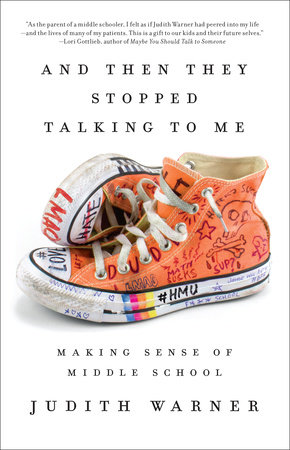Through the stories of kids and parents in the middle school trenches, a New York Times bestselling author reveals why these years are so painful, how parents unwittingly make them worse, and what we all need to do to grow up.
“As the parent of a middle schooler, I felt as if Judith Warner had peered into my life—and the lives of many of my patients. This is a gift to our kids and their future selves.”—Lori Gottlieb, author of Maybe You Should Talk to Someone
The French have a name for the uniquely hellish years between elementary school and high school:
l’âge ingrat, or “the ugly age.” Characterized by a perfect storm of developmental changes—physical, psychological, and social—the middle school years are a time of great distress for children and parents alike, marked by hurt, isolation, exclusion, competition, anxiety, and often outright cruelty. Some of this is inevitable; there are intrinsic challenges to early adolescence. But these years are harder than they need to be, and Judith Warner believes that adults are complicit.
With deep insight and compassion, Warner walks us through a new understanding of the role that middle school plays in all our lives. She argues that today’s helicopter parents are overly concerned with status and achievement—in some ways a residual effect of their own middle school experiences—and that this worsens the self-consciousness, self-absorption, and social “sorting” so typical of early adolescence.
Tracing a century of research on middle childhood and bringing together the voices of social scientists, psychologists, educators, and parents, Warner’s book shows how adults can be moral role models for children, making them more empathetic, caring, and resilient. She encourages us to start treating middle schoolers as the complex people they are, holding them to high standards of kindness, and helping them see one another as more than “jocks and mean girls, nerds and sluts.”
Part cultural critique and part call to action, this essential book unpacks one of life’s most formative periods and shows how we can help our children not only survive it but thrive.
On sale: March 9, 2021
Grade: Grades 6-8
Page count: 336 Pages
ISBN: 9781101905890
Judith Warner is the author of the
New York Times bestsellers
Perfect Madness: Motherhood in the Age of Anxiety and
Hillary Clinton: The Inside Story, as well as the award-winning
We’ve Got Issues: Children and Parents in the Age of Medication. A senior fellow at the Center for American Progress, Warner has been a frequent contributor to
The New York Times, where she wrote the popular Domestic Disturbances column, as well as numerous other publications.
“Fascinating . . . well researched . . . Judith Warner interviews scores of fellow middle school survivors in her accomplished and highly readable new book. . . . She also gets personal with her tales of middle school woe—both as a former student and as a parent.”
—Shannon Hale, The New York Times Book Review
“With clarity, compassion, and insight,
And Then They Stopped Talking to Me brilliantly captures the landscape of kids’ experiences today and the psychological, familial, and cultural forces shaping them. Along the way, Warner debunks age-old myths and offers practical guidance that every parent can use. This is a gift to our kids and their future selves.”
—Lori Gottlieb, author of Maybe You Should Talk to Someone
“Judith Warner offers both fascinating social history and practical advice on a life-stage that sends many adults into a PTSD spiral. She shows how, by compassionately revisiting their own pasts, parents can truly support early adolescents in developing the building blocks for long-term happiness.”
—Peggy Orenstein, author of Boys & Sex and Girls & Sex
“I don’t know a single adult who did not feel alone, insecure, or deeply self-conscious in middle school. Warner puts the pieces of the puzzle together to show us just how not-alone we were.”
—Rachel Simmons, author of Odd Girl Out and Enough As She Is
“I have often advised parents not to allow themselves to be sucked back into middle school when they see their children’s distress or hear their war stories. But I had no guidebook to offer them. Now I do.”
—Michael G. Thompson, co-author of Raising Cain
“Warner has written a compulsively readable book . . . I only wish I’d had it on my bedside table when my own kids were adolescents. But I’d actually recommend it for parents at any stage, as it holds a mirror up to us as much as to our kids.”
—Anne-Marie Slaughter, author of Unfinished Business: Women Men Work Family
“I learned a tremendous amount reading this book!”
—Rosalind Wiseman, author of Queen Bees & Wannabes and Masterminds & Wingmen
“Judith Warner’s remarkable, compassionate, fascinating look at the terrifying abyss that is called middle school has given me a perspective and insight that I only wish I’d had decades ago. It’s a must.”
—Ayelet Waldman, author of Bad Mother and A Really Good Day
“An indispensable parents’ companion for navigating one of the most challenging and extraordinary stages in life.”
—Madeline Levine, author of The Price of Privilege and Ready or Not

















